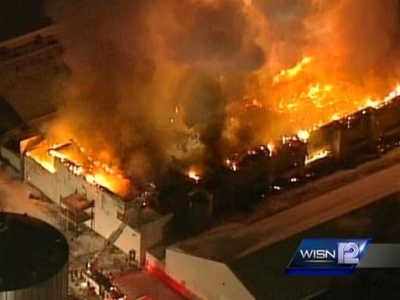Last week, a four-alarm fire broke out at S&R Egg Farm in Wisconsin’s Walworth County – more than 100 firefighters were called out to battle the blaze. After the fire was put out, a WISN 12 news report declared “no injuries” and the company’s website further confirmed that it’s “happy to report no injuries.”
In reality though, an estimated 300,000 egg-laying hens perished in the blaze. Crammed inside barren wire cages that were stacked in the warehouse-like shed that was fully engulfed in flames, these birds never even had a chance to escape. And there were no sprinklers to quell the flames. Yet the media and the factory farm reported “no injuries?”
Why is it that the lives of chickens, who’ve exhibited intelligence and emotional depth equal to the cats and dogs with whom we share our homes, are not even considered a loss?
Overall, S&R Egg Farm confines 2.4 million egg-laying hens in its facilities–800,000 at the site of the fire–and produces 2 million eggs per day. The company plans to rebuild after the fire, but will it implement fire precautions to better protect the hens?
Currently, fire precautions are not required on farmed animal facilities, a shocking fact considering that large-scale fires are not uncommon on factory farms. Just in the past few years, factory farm fires have killed more than 2,000 pigs in Kansas, 7,000 turkeys in Minnesota, 500,000 hens in Colorado, and nearly 250,000 hens in Ohio.
In 2012, the US National Fire Protection Association (NFPA) recommended automatic fire sprinklers and smoke-control systems be required in “animal housing facilities.” This was unsurprisingly met with a mountain of opposition from animal agribusiness, and NFPA eventually succumbed to this industry pressure.
How can you help? The best way each of us can express our compassion and take action to protect farmed animals is to simply choose meat-, egg-, and dairy-free foods. Start today by visiting (and sharing) TryVeg.com.

